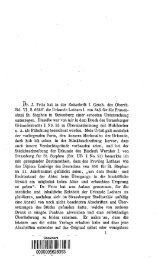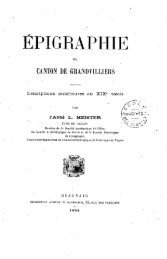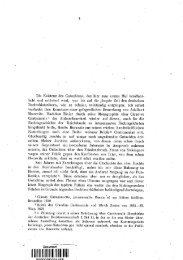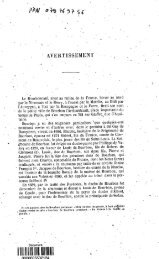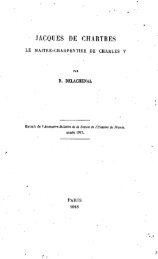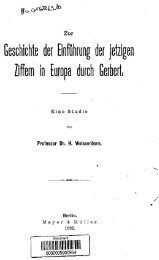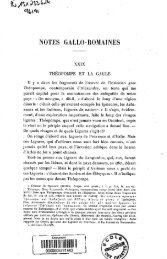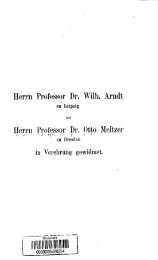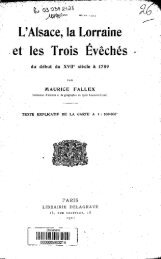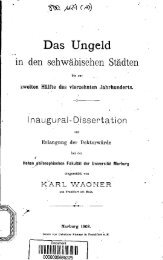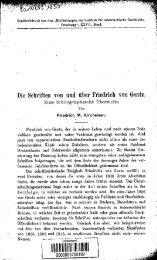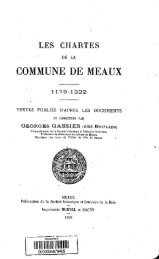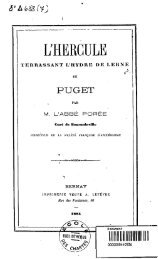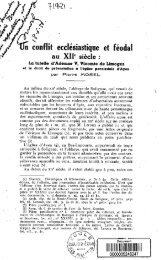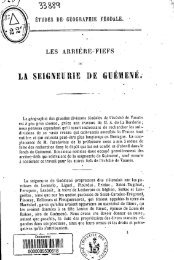4P Li gç(' TRANSACTIONS
4P Li gç(' TRANSACTIONS
4P Li gç(' TRANSACTIONS
You also want an ePaper? Increase the reach of your titles
YUMPU automatically turns print PDFs into web optimized ePapers that Google loves.
796 LE LIVRE DE YCONOMIQUE DARISTOTE [TRANS. AMER. PHIL. SOC.<br />
The rather frequent errors in his quotations suggest that<br />
he often cited them from memory, without checking<br />
their accuracy, but at least some of the errors must be<br />
attributed to the ignorance of the scribes.<br />
An examination of the originality of Oresme's glosses<br />
yields results that are, from the standpoint of modern<br />
scholarship, both startling and revealing. In the Yconomique,<br />
he mentions by name only one of the earlier<br />
Latin commentators of the Economics, of whom there<br />
were several. Yet when we turn to these Latin expositions—commentaries<br />
or quaestiones—we notice two<br />
striking features: (1) the passages glossed by Oresme<br />
are in many instances the same as those previously<br />
glossed by his Latin predecessors and these Latin glosses<br />
are in turn closely patterned on the earliest of the expositions,<br />
that of Durandus de Hispania; (2) Oresme's<br />
glosses are often little more than paraphrases of these<br />
Latin glosses, frequently , greatly abbreviated or occasionally<br />
augmented with new material interpolated by<br />
Oresme himself. If this methodical transmission of<br />
earlier exegesis, usuall y unacknowledged, seein g reprehensible<br />
today—"a whole pedigree of plagiarism," it has<br />
been called 27—the fact is that Scholasticism was essentially<br />
a method of instruction for university students,<br />
a pedagogical system designed to preserve a uniform<br />
teaching of universally accepted truth, upon which the<br />
individual scholar infringed at his peril. Deviations do<br />
occur, of course; but tradition is a stern mistress and<br />
any notable irregularity was likely to give rise to charges<br />
of heresy, greatest of all sins. The great scarcity of<br />
books generally favored the repetitiousness of mediaeval<br />
scholarship; readers were usually too glad to welcome<br />
the appearance of any new work to be much concerned<br />
with the originality of its contents. Under such circumstances,<br />
"even the plagiarist was a public benefactor."<br />
28<br />
Thus it is possible to trace the substance of several<br />
glosses in the Ycono;nique back through the Latin expositions<br />
of the Economics by Jean Buridan (Quacshones),<br />
William of Occam (Quaeshiones), Ferrandus<br />
de Hispania (Scholia), Barthélemy de Bruges (Cornmentum<br />
and Quaestiones), Albertus Magnus (Expos'itio)<br />
and finally, the prototype of all of these. Durandus<br />
de Hispania (Cons;nentarium). Doubtless there are still<br />
other unidentified expositors included in Oresme's<br />
blanket references to une al4tre exposition, les exposileurs,<br />
etc. (343a, 345a, 346a, etc.). His attitude towards<br />
expositors in general is shown in a significant<br />
remark in the Pofitiques: " No one should marvel if I<br />
do not always follow the expositors, for I find them often<br />
contradicting one another and at odds with the text<br />
itself." 29 We can hardly censure him, surely, for de-<br />
Synsmachus, Ef,istolae, 1; Vergil, Aeneid, 2, Georgics, 2;<br />
Vitruvius, Dc Architectura, 1; Ysopet-Arionnef, 1.<br />
By G. G. Coulton, Medieval panoranw, 450, New York,<br />
Meridian Books, 1955.<br />
Ide,n, 580.<br />
Polithjucs, Avranchcs, BihI. Municipaic, 31s. 223, fol. 103d.<br />
pending upon his predecessors for historical or geographical<br />
references, for these commentaries were the<br />
tools of learning with which he worked in full confidence<br />
of their trustworthiness; their authors were among the<br />
most distinguished scholars of the age and Oresme<br />
utilized their works as we use an encyclopedia today.<br />
Of all these Latin expositors, why Oresme should have<br />
singled out only Barthélemy (le Bruges to mention by<br />
name remains something of a mystery. This Flemish<br />
master of arts and doctor of medicine wrote a cornmentarv<br />
and also Quaestiones on the Economics, both<br />
in 13O9,° when he began his long though intermittent<br />
service as lecturer at the Sorhonne. He was court<br />
physician to the French king Philip VI, and made frequent<br />
benefactions to various colleges of the University<br />
of Paris. Since he was still living in 1356, it is not tinlikely<br />
that Oresme knew him personally. Oresme liked<br />
to enliven his glosses with occasional exempla or apposite<br />
anecdotes, and Rarthéleniy's account of the son<br />
condemned to the gallows who blames his mother for<br />
his plight (342b) may have struck him as worthy of<br />
special acknowledgment, although this c.rcotpiunz was<br />
not original 31 with Barthélemy and Oresnie must have<br />
accredited it to Hartliélemy simply because he had the<br />
latter's work in hand at the moment.<br />
Merely because Oresme depended so often upon his<br />
predecessors, it must not be inferred that his glosses<br />
contain nothing of his own invention. On the contrary,<br />
the majority of his glosses are wholly or in part original.<br />
His numerous cross references to parallel passages in<br />
30 According to the explicit in Venice, Bib!. Marciana, Class.<br />
XII, cod. 9, if. 130-154, which contains lsth works. Barthélemy<br />
wrote commentaries on Galen, Hippocrates and Avicenna, as<br />
well as on several Aristotelian treatises. Copies of his commentary<br />
on the Economics—called Scriptum in the manuscripts<br />
—and Quoestiones on the same work are preserved at Bologna,<br />
Cracow, Erfurt, Paris, Venice, and Vienna. His short medical<br />
tract Re,nediurn epidemias (oil the Black Plague) has been<br />
published by Karl Sudhoif, Archiv für Geschiclztr der 3ledi:iu<br />
5: 39-41, 1912. Barthélemy lectured at the Sorbonne from<br />
1308-1330 and again from 1342-1354. The best account of<br />
his life and writings is the article by Charles V. Langlois,<br />
Barthélcmy de Bruges, maitre ès arts et en médecinc, Hisfoire<br />
lie téraire de ha France 37: 238-250, Paris, Imprimerie Nationale,<br />
1938. On his contribution to medicine, cf. Ernest Wickersheimer,<br />
Dictionnaire biagraJ'hiquc des médecins en France au<br />
snoycn-âge 1: 60, Paris, Droz, 1936.<br />
31 Paul Meyer traced the original version of this exem/'lurn<br />
to an anonymous tract of the late twelfth century, Dc scolariurn<br />
disciphinis, Migne, Patrologia latina 64: 1227, It appears in at<br />
least four thirteenth-century writers—Eudes of Chcrington,<br />
Jacques de Vitry, Vincent de Beauvais and finally in Philippe<br />
de Novarre. Cf. Paul Meyer, L'Enfant gãté devenu crisninel,<br />
Romania 14: 581-583, 1885. Barthélemy's account reads as<br />
follows in Bib!. Nat., .11's. lat. 14704, fol. 46v: "Audivi de quodam<br />
prope terrarn nostrarn qui, instigatus a(l furturn a matre, cum<br />
duceretur ad patibulum, dixit matri quod vellet cans osculari,<br />
et, cuin tangeret earn, arnordebat sibi nasum, dicens: 'Vos<br />
fecistis me suspendi, teneatis sallarium vestrurn.' " This follows<br />
almost verbatim the story in Jacques de Vitry's Sermones, no.<br />
26. It is hardly credible that Orcsrne discLz'crcd this oft-told<br />
talc in Barthélcrn y's ()uu'sto;i,'s.



